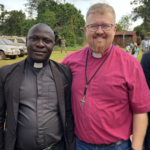
The Hard Part About Pastoring
Years ago I had a vision of being a pastor. It was entirely based on the false assumption that pastoring was only concerned with preaching. That was naive on my part. I completely own it.
But after earning multiple advanced degrees in Christian theology and pastoral studies, even serving at an academic theological institution, none of that experience prepared me for the tiresome and often draining work that is pastoring.
Pastoring and Emotional Labor
Recently I read Preaching Through Adversity by John Piper. Based on the life and ministry of C.H. Spurgeon, Piper chronicled the day to day struggles of pastoring and the challenges associated with the work.
A pastor’s soul is exposed each and every week as he delivers the word of God. Depending on the circumstances and forces affecting his flock, his labor may be met with silence, criticism or praise. If his heart is not right or motive is one degree off, he can find himself either wrecked by a cutting word or soar pridefully because of misplaced praise. In either case, his soul is vulnerable. Most pastors that I know do not struggle with the latter.
Here is how I know that to be true.
I recently had the chance to speak with an expert in the field of emotional intelligence, Dr. Scott Livingston, on the effect of emotions on ministers.
One area where most ministers that he works with struggle is in the critical area of self-regard. Pastors, as a general rule, seem to rate themselves lower in metrics of self-regard than leaders in other industries.
That was interesting to me. Could it be because of John Piper’s observation? Or is something else contributing to the problem?
Pastoring and Empathy
Good evangelical theological training will typically focus on biblical studies, systematic and historical theology, and practical theology. If a minister comes from a good school, a pastor may get a course in pastoral counseling. But here is the thing. Pastors are not licensed mental health practitioners. Very often, however, they are the first ones to hear about a major trauma, abuse, or dysfunction wrecking a parishioner’s life.
Learning to cope with a crisis is part of the job of pastoring.
Depending on the pastor’s level of empathy, the burden can seem overwhelming. Empathy is necessary to pastoring, but compassion left unfettered can be toxic. Learning to channel my empathy into constructive responses has been part of my journey as a pastor. That has not been easy.
The hardest part about being a pastor, however, is the inevitable suffering that comes not from criticism or unmet expectations but in those private confessions of past pain, abuses, or traumas from hurting parishioners. Intimacy and vulnerability at this level are both an honor and a burden.
Here are two examples. This past Sunday, a person shared with me their fear of Father’s Day. Unlike my experience, their childhood was marked by molestation and abuse. The one who was supposed to be a provider, protector, and nurturer, instead was a violator and thief of innocence. Father’s Day, for her, was a memorial of an ideal lost rather than a day commemorating a particular person.
Again, on Sunday, I learned of another father who took his life leaving children behind to pick up the wreckage. That family is now in the grieving process on a day that was supposed to be marked by joy and fun.
Somehow after Sunday’s services, I had to collect myself emotionally enough to focus my attention then on my family’s plans for me. While at the same time I was still processing the emotional fallout of the morning. Welcome to pastoring.
It’s in moments like these when I lean on the Old Hymn “My Hope is Built on Nothing Less.”
“When darkness veils his lovely face,
I rest on his unchanging grace;
in every high and stormy gale,
my anchor holds within the veil.
On Christ, the solid rock, I stand;
all other ground is sinking sand,
all other ground is sinking sand.”
So It’s Not What It Seems
So pastoring is at times less spotlight and more heartache.
As it turns out, the brokenness of the world is often less known and less visible to parishioners sitting in the pews. But as I look out each Sunday and scan the seats, I see the stories present. I see the heartache.
But I also see the Gospel at work. I know that God’s Spirit is alive, bringing his redemptive purposes to fruition. And that excites me and helps me find joy in the toil of pastoring.





The first 50 years of ministry are the hardest.
Jim, your comment cracked me up! Thanks for the laugh. So in summary, it’s just hard, plain hard! Thank you for commenting.
Yep! I sure can attest to Basinger’s remarks as I rejoice in my 52nd year in the priesthood! Keep going forward, Jonathan! It’s a wild ride!